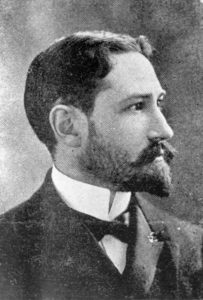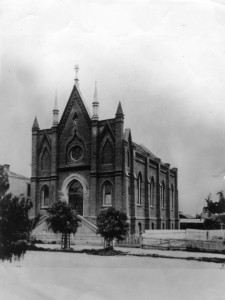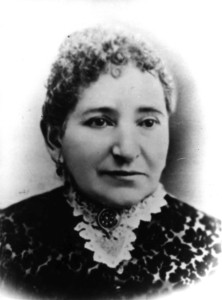Rabbi Abraham Wolf Edelman
![WS2849-^Rabbi Abraham Wolfe Edelman ^Cong. B'nai B'rith-Los Angeles,CA [1870's]](http://www.jmaw.org/wp-content/uploads/2012/08/WS2849-19-N-Edelman-Cong_-Bnai-Brith-Los-AngelesCA-1870s1-184x300.jpg)
Rabbi Abraham Wolfe Edelman, first rabbi of Congregation B’nai B’rith, Los Angeles (now Wilshire Boulevard Temple)
Abraham Edelman, the pioneer rabbi of Los Angeles, was born in Poland in 1832.
He came to the United States with his wife, Hannah Pessah Cohn, in 1851.
Eight years later they were living in San Francisco, where Abraham seems to have spent his time continuing his own Hebraic studies, teaching Hebrew, and for a time acting as a dry goods salesman.
Los Angeles
When Rabbi Abraham Wolf Edelman arrived in the Pueblo of Los Angles, it was something of a wild west frontier town.
Joseph Newmark, Los Angeles’ great organizer and himself the lay-rabbi and Judaic scholar of the community, persuaded Rabbi Edelman to come to Los Angeles as its first full-time Jewish spiritual leader and community servant.
He served Congregation B’nai B’rith from its inception in 1862 to 1885, and during that time was the Jewish spiritual leader of Los Angeles.
History records that Rabbi Edelman was a “traditional” Orthodox rabbi, although this might not be accurate.
There were two good reasons for Rabbi Edelman to be called to Los Angeles: The small community had a number of children who needed a teacher to help them maintain their ethnic identity and spiritual heritage, and the adult Jews wanted a spokesman and ambassador to help them in their religious and ethnic needs.
Edelman fulfilled with dignity his role as spokesman and ambassador.
He combined the offices of rabbi and cantor, although he never claimed ordination.
Before coming to Los Angeles he had never held a pulpit.
In those days a cantor did not need an operatic voice, but he had to be skilled in liturgy, and Edelman was.
Community
Rabbi Edelman spoke Spanish and soon was dubbed the padre by the Spanish-speaking residents of this Pueblo.
Edelman joined many civic organizations, including the Masonic Lodge #42, and he served as the founding Master of a lodge at Wilmington.
He donated to many charitable causes, and did everything he could for the Jewish community, which numbered about 200 at his arrival, as well as the over-all community.
Fraternal affiliation by Los Angeles Jewry, as with others, was part of the Americanization process.
The Myth
Rabbi Edelman retired from his position in 1886, the victim of his own success and the growth of the Los Angeles community.
He was eased out under cover of a myth calculated to protect the congregation and spare the rabbi’s feelings.
Harris Newmark, President of B’nai B’rith Congregation from 1881 to 1887, started the myth by stating that in 1885, when local Jewry instituted a much more liberal ritual, Rabbi Edelman’s convictions induced him to resign.
The evidence suggests that Rabbi Edelman was never part of a truly Orthodox establishment.
Reform Judaism came to the West Coast as the slow reforming of Orthodoxy, the adaptive process of a living faith accommodating to the new life of the West.
During his long career, Edelman showed signs of his non–Orthodox inclination, including allowing mixed seating for men and women, a mixed choir, conformation ceremonies, and English prayers and sermons.
Congregation B’nai B’rith developed a type of Reform Judaism that was grounded in tradition and committed to contemporary relevance.
However, despite the community’s growth, Rabbi Edelman remained a frontier clergyman. He lacked the glamor desired for the new era.
Los Angeles still loved “old Edelman,” but they decided to shelve him. The myth was devised to preserve the conscience of the community and the feelings of the Rabbi.
From June 1885 to June 1886, Edelman served Congregation Ahavai Sholom in Portland, Oregon.
A news item noted that the Orthodox synagogue had “at last succeeded in electing an honorable gentleman as their chazzan and we fervently hope that Mr. Edelman, formerly of Los Angeles, will be better that his predecessor.”
Edelman resigned from the Portland post in mid 1886, citing the “dampness of the Oregon climate,” and returned to Los Angeles.

Dr. David W. Edelman, 1869-1933, #WS0089
Real Estate
Rabbi Edelman purchased property at the corner of 6th and Main Streets and erected a multi-story building. This building supplied him with rents to supplement his salary and retirement.
After his death, his estate — made mostly of the building’s value — totaled $200,000, much of which he designated for charity.
Rabbi Abraham Edelman was the first of a line of Los Angeles rabbis that had real estate holdings, making pressures from their congregations and boards easier to handle.
Family
Abraham Edelman married Hannah Pessah Cohn in Warsaw in 1851.
Together, they had 6 children, two girls and four boys.
The girls were named Rachel and Matilda. The boys were named Benjamin, Abraham M., Henry W., and David W.
Sources
- Gary Miranda, Following a River: Portland’s Congregation Neveh Shalom, 1869-1989 by (Portland: Jewish Historical Society of Oregon, 1989).
- Norton B. Stern and William M. Kramer, “Rabbi Abraham Wolf Edelman: Jewish Padre to the Pueblo,” Western States Jewish History 38/3&4.
- Norton B. Stern, “Rabbi Abraham Edelman,” Western States Jewish History 41/1.
- Norton B. Stern, “Rabbi Abraham Edelman: Interview with His Descendants Mrs. Aaron Dechter and Mr. Arther W. Silver,” Western States Jewish History 41/3.
- William M. Kramer, “They Called the Rabbi Padre,” Western States Jewish History 42/2&3.
- William M. Kramer, “Historic Letter from the Bishop, 1880,” Western States Jewish History 42/2&3.
- William M. Kramer, “Why Did the Rabbi Go East?; 1890,” Western States Jewish History 42/2&3.
Thank you to Eliezer (Daniel) Froehlich of Corvallis, Oregon, for information on Rabbi Edelman’s time in Portland.


